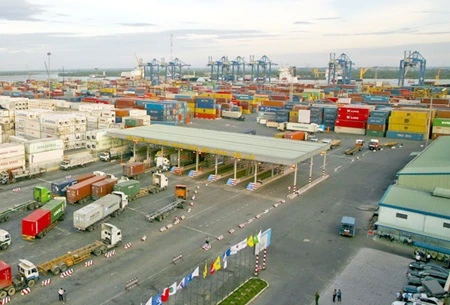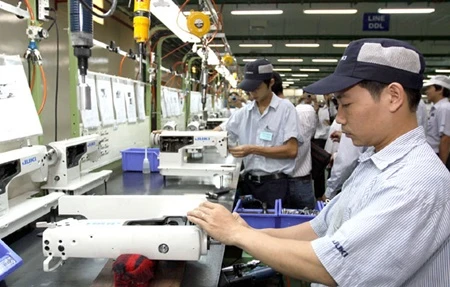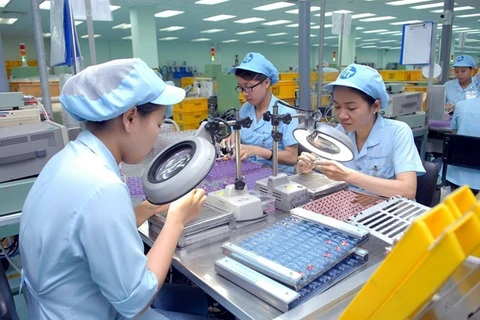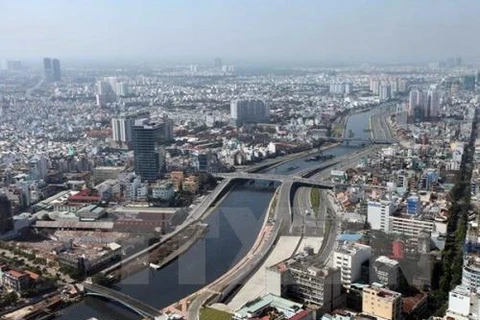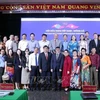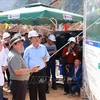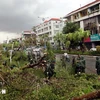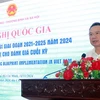HCM City (VNA) – Ho Chi Minh City has achieved its “dual goal” of containing the COVID-19 pandemic and reviving the economy, Nguyen Thanh Phong, Chairman of the municipal People’s Committee, told a recent meeting.
Speaking at a meeting held on January 9 to discuss the city’s socio-economic development plans for 2021, Phong said the city was able to contain the virus while achieving economic growth of 1.39 percent, and all sectors managed to achieve growth.
Despite the challenges caused by the pandemic, its revenues topped 371.3 trillion VND (16.1 billion USD) or 91.51 percent of the target, he said.
Exports were worth more than 43 billion USD, foreign investment exceeded 4.3 billion USD and remittances were worth more than 5.5 billion USD.
More than 40,000 new businesses were established with a total registered capital of more than 1.1 million VND.
Some 8,300 resumed operations after suspending business due to the pandemic.
The city has been able to quickly bring the recent local transmission of COVID-19 under control.
Only eight people are currently being treated, and there has been no death in the city, Phong said.
He attributed the excellent results to “the concerted efforts made by the Government, public and businesses.”
Phong said the city would try to achieve all socio-economic targets set for this year.
It would continue to build an urban government and improve its investment environment, he said.
It would focus on speeding up digital transformation, build a smart city, and speed up administrative reform, he said.
It has set an economic growth target for 2021 of at least 6 percent, with the services sector accounting for 60 percent of the economy.
The per capita income target is 6,500 USD.
The city is set to create 140,000 jobs this year, taking the urban unemployment rate to below 4 percent, Phong said.
It also set other targets such as a fertility rate of at least 1.39 children, land used for transport being 12.76 percent of urban land, among others.
The average housing area per capita will be 21.04sq.m, and the urban greenery rate will be at least 0.55sq.m.
However, Phong admitted that the targets would be hard to achieve since the pandemic remains a threat in most parts of the world with the new variants in the UK and South Africa believed to be much more infectious./.
Speaking at a meeting held on January 9 to discuss the city’s socio-economic development plans for 2021, Phong said the city was able to contain the virus while achieving economic growth of 1.39 percent, and all sectors managed to achieve growth.
Despite the challenges caused by the pandemic, its revenues topped 371.3 trillion VND (16.1 billion USD) or 91.51 percent of the target, he said.
Exports were worth more than 43 billion USD, foreign investment exceeded 4.3 billion USD and remittances were worth more than 5.5 billion USD.
More than 40,000 new businesses were established with a total registered capital of more than 1.1 million VND.
Some 8,300 resumed operations after suspending business due to the pandemic.
The city has been able to quickly bring the recent local transmission of COVID-19 under control.
Only eight people are currently being treated, and there has been no death in the city, Phong said.
He attributed the excellent results to “the concerted efforts made by the Government, public and businesses.”
Phong said the city would try to achieve all socio-economic targets set for this year.
It would continue to build an urban government and improve its investment environment, he said.
It would focus on speeding up digital transformation, build a smart city, and speed up administrative reform, he said.
It has set an economic growth target for 2021 of at least 6 percent, with the services sector accounting for 60 percent of the economy.
The per capita income target is 6,500 USD.
The city is set to create 140,000 jobs this year, taking the urban unemployment rate to below 4 percent, Phong said.
It also set other targets such as a fertility rate of at least 1.39 children, land used for transport being 12.76 percent of urban land, among others.
The average housing area per capita will be 21.04sq.m, and the urban greenery rate will be at least 0.55sq.m.
However, Phong admitted that the targets would be hard to achieve since the pandemic remains a threat in most parts of the world with the new variants in the UK and South Africa believed to be much more infectious./.
VNA

